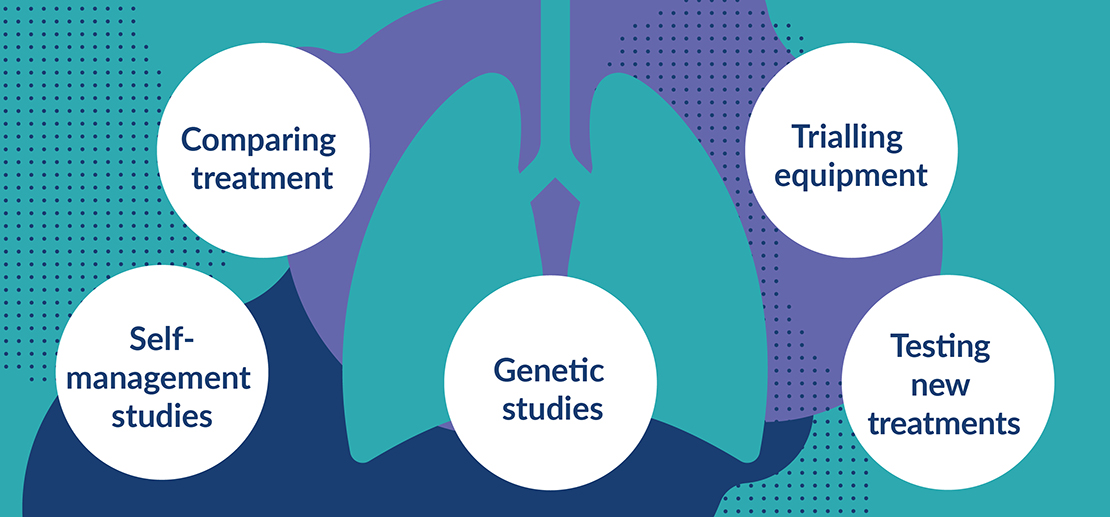According to Asthma + Lung UK, there are currently an estimated 5.4 million people receiving treatment for the condition. Asthma is treatable in most cases, but every day an average of four people die from an asthma attack.
Asthma is caused by inflammation of the airways which carry air into the lungs. Triggers can vary and may include viruses or allergies. Research is vital for better understanding of the condition, its treatment and the ways people manage it day to day.
Here, we highlight some of the ongoing research in the area, some significant findings from the past few years and what getting involved in an asthma study might entail.
Breakthroughs in asthma research
Although the condition is relatively familiar to most of us, there is still much that is misunderstood around the diagnosis, treatment and management. Studies focused on these areas have returned some important results that have helped shape current and future asthma care.
The University of Leicester, University of Nottingham and National Institute for Health and Care Research (NIHR) Nottingham and Leicester Biomedical Research Centres (BRCs) led the largest ever study of people with moderate to severe asthma, to see if they could identify genetic factors which might cause asthma. The study identified certain genetic variants in the patients which may be associated with developing asthma. This finding, published in 2018, means that new, better treatments could be developed which target these particular genes.
One major research breakthrough in asthma treatment looked at one severe form of asthma known as eosiniphillic asthma. This doesn’t respond to the usual methods of inhaler treatments, and is often treated with steroids.
However, research from a series of studies funded by Glaxo Smith Kline and recruited by the NIHR, found that the drug Mepolizumab reduced the number of asthma attacks, improved the lung function and quality of life for patients in the study. This was a significant finding and marked the first entirely new treatment in asthma for 20 years.

Current asthma research
Asthma research is critical to better understanding the condition, its causes, and ways to treat and manage it. Here are some of the studies currently underway:
The asthma breathing record study
This study uses a new device called “N-Tidal” to monitor the breathing of people with asthma. When a person breathes into the handheld device measures the amount of carbon dioxide exhaled is measured. The study is sponsored by Cambridge Respiratory Innovations Limited and funded by NIHR; Portsmouth Hospitals NHS Trust.
Participants will be asked to breathe in and out through the mouthpiece at their normal rate and the carbon dioxide (CO2) expelled will be recorded. The study aims to see if the monitor can accurately predict whether an asthma attack is about to occur, as the pattern of how the participants breathe out changes before and during an asthma attack. If accurate, this could help people recognise when their asthma is getting worse, so they can take action before they could end up in hospital.
Should children with asthma take their inhaler daily or just when they have symptoms?
Traditionally, children with asthma have been required to take a “preventer inhaler”, which stops prevents their airways getting irritated and therefore helps control their asthma. However, a study funded by NIHR Health Technology Assessment (HTA) Programme, is looking into whether using preventer inhalers just when symptoms occur, rather than daily, could be just as effective.
Implementing improved asthma self-management as routine
Focusing on the day-to-day management of asthma, another study, sponsored by the University of Edinburgh and funded by the NIHR Central Commissioning Facility, is addressing the fact that many people with asthma do not have the support they need for self-management of the condition. As well as developing new patient resources and training for healthcare professionals, monthly feedback and patient-centred review templates will be created, so healthcare professionals can better understand and respond to patient concerns and issues that may arise around self-management.
The aim of the study is to better enable patients to manage their condition, with the support of their healthcare professionals.
These are just a few examples of the wide array of asthma studies which are happening at the moment. But if you’re thinking about applying to be part of an asthma study, here is some information on what it might involve.

What might asthma research involve?
Here's a look at the different types of asthma research you could take part in:
- Treatment trials: Some studies will look at the effectiveness of one type of treatment or drug vs another and maybe a placebo, to see if one of the drugs works better than the others for people with asthma.
- Trialling new equipment: Inhalers are the usual treatment for asthma, but some studies look into which types of inhalers work best, and others may look at new types of equipment, such as the N-Tidal, mentioned in the study above.
- Self-management programmes: Using self-reporting methods such as diaries or following up new methods of self-management with questionnaires, these studies look at the real-life impact of different ways of managing asthma.
Should you wish to find out more about taking part in asthma research, you can find details of asthma studies currently looking for people to take part.
Other ways to take part in research
You can sign up to Be Part of Research to be contacted about a range of health and care research. Or if taking part in a study doesn’t feel right at the moment there are other ways to get involved in research.







